- Home
- Peter Ackroyd
The Fall of Troy Page 18
The Fall of Troy Read online
Page 18
TWENTY-THREE
The recollection of the woman’s cry had stayed with Sophia, even after she had left Thornton’s quarters and returned to her own. For her that cry was associated with the sternness of Maria Skopelos, with the sight of the goat dancing to the music of the flute and, curiously enough, with the sudden arrival of Leonid after her long sleep. There was no obvious connection between these matters, but for Sophia they seemed to form a pattern for which she could not find the thread. Why had she fainted, or fallen asleep, in the company of Maria and Theodore? Leonid had arrived with the purpose of escorting her back. And this was the odd thing. He had not reacted to the cry of the woman. He had insisted that the goat, excited after its dance, had made Maria shriek out loud in the kitchen. But she was sure that it had been a cry of anguish. So she determined upon a journey.
“I am riding into Kannakale,” she told her husband, on the following morning. “I have a longing to see shops and markets.”
“A woman speaks! You have every right to buy nice things, Sophia. You deserve the finest. Frau Obermann must be perfect.”
“Do you think the Central Hotel will be suitable?”
“You wish to stay there? Of course. They know me well. I will ask Telemachus to go ahead and reserve the largest suite for you.”
“No, Heinrich. This is my adventure. I will arrange everything.”
“Whatever you desire. Buy silk and linen. Buy fine shoes. Here is gold for you.” He went over to a corner of their quarters, and took some coins from a vase.
“No, Heinrich. I have money of my own. And I have my jewels from Athens. I do not need gold.”
“As you wish.” He seemed disappointed. “You will be Artemis disguised as a mortal woman, stepping in a bright cloud among the people.”
“I hardly think so. We are all mortal.”
“Never say it, Sophia. We are gods in our ambitions. The will is god.”
“I have a dangerous husband.”
“A loyal husband. A faithful husband who offers you gold.” He laughed. “There is no woman on earth who could resist me.”
“We will not put the matter to the test. Now I must prepare.”
She had conceived no definite plan. She was not even sure of her intention, other than to ride out to the farm and discover more about Maria and Theodore Skopelos. She realised, of course, that she would then find out more about her husband’s previous life. So, as she rode on the dusty track towards Kannakale, she was excited by a vague sense of trespass and of guilt. Two kites sailed above her, and seemed to be watching her, so she spurred on the horse and rode faster; the birds continued their languid course above the plain, and she smiled at her own folly.
When she reached the town she decided to stop at the Central Hotel and reserve a room; if her visit to the farm proved fruitless, she would need somewhere to sleep that night. While the horse was being fed and watered in the courtyard, she lay upon her bed as the wooden fan revolved slowly above her. And then she noticed that she was trembling. It was not the coolness of the room after the heat of the journey. It was fear. Of what should she feel afraid? Or was it some general terror that had afflicted her? She stood up and walked over to the window, from where she could see the people of Kannakale engaged in the usual activity of the town. And slowly the fear left her.
SHE TOOK THE ROAD out of Kannakale, which wound along the coast towards the village of Karamic. It was already afternoon, and the heat of the day bore heavily upon her; she had eaten and drunk nothing since her departure from Hissarlik. There was a stream somewhere close to her, but she did not trust the brackish and slow-moving water of the plain. When she saw the stone hut of the watcher of the sea, however, she forgot her weariness. She hesitated to disturb the hermit in his meditation, but she knew that it was customary to offer refreshment to the passing traveller. When she approached the small dwelling, she saw that the door was open.
She tethered her horse to the wooden post by the side of the hut, and walked towards the open door. He had sensed her presence before he had heard her footsteps, and asked in Turkish who was there. She had learned a few words from the workers in Hissarlik, and was able to explain in his own language that she was a traveller in need of water. He came on to the threshold. He was very tall, and pale, his long dark hair about his shoulders; he had a moustache and a beard, also grown long. He did not look at her; he kept his eyes averted, out of politeness or humility. He told her that there was water for her, plentiful water, but that she must remain outside. He went back into the hut and returned with a pitcher and bowl. Still he did not look at her. It was perhaps not permissible for him to look at a woman. She drank greedily from the proffered bowl, and he seemed to clench and unclench his hands as she did so. As soon as she had thanked him, he looked at her. It was as if she had suddenly been shaken by some material force. His eyes were so pale that the irises seemed almost white, the palest blue against snow. There was nothing there but silence and solitude and mourning; in the pale eyes of the hermit, she saw caves and barren mountains and lonely paths. Then he looked away, and the sensation was gone.
He asked her where she was going, and she pointed in the direction of the farm. He shook his head. “Do not go there,” he told her. “A mad woman lives there. Mad woman!” Deli kadin! As he repeated the phrase, he held out his arms and looked down at the ground as if he were some image of crucifixion.
She thanked him for the gift of water, and left him. It was as she had suspected. The strange cry had come from a woman whom the watcher of the sea deemed to be mad. Had he observed her along the small paths and trackways of this neighbourhood? Or, more likely, had he heard reports from those who left him offerings of food and drink? She rode more slowly now, reflecting upon the connection between her husband and Theodore Skopelos. She turned a bend as the path followed the track of the stream, and was alerted by a sudden sound—a little way ahead of her was the unmistakable figure of Leonid riding upon his white horse towards the farm. She dismounted immediately, and waited in the shade of an alder tree growing beside the stream. Why had Leonid returned? Had he come to retrieve the treasures that she had carried here so many weeks before? It seemed the most likely explanation. Nevertheless, she was curious. She left her horse tethered by the stream, and set off along the dirt path.
She could see the farm buildings ahead of her, and she slowed her pace. She did not wish to come too close. She did not yet want to be seen. Then she heard the laughter—hysterical laughter, wild laughter filled with misery. It was the laughter of the mad woman. Sophia could not help walking forward. It was as if she were drawn towards this despair. Then she could see the figures in the yard; on going closer, she could make out the profile of Leonid. He was sitting on the ground, while beside him stood a woman wrapped in a white sheet or blanket. Her grey hair hung down to her shoulders, and her face was savage; it looked as if it had been moulded, eaten away, by monstrous thoughts. Then the woman dropped to her knees and the two of them—Leonid and the woman—began to paw each other like dogs in a dog game. Sophia could not endure this. She continued walking forward, more quickly now. The woman sensed her first, and growled at her.
Leonid turned, and saw Sophia coming towards him. He rose to his feet.
“What is this terrible thing, Leonid? What are you doing here?” He shook his head and said nothing. He looked at her as if he pitied her. “Answer me. What are you doing?”
“Sophia, this is my mother.”
The woman shrieked at Sophia, crying out in Russian, “Mother! Mother!” Matrishka!
Sophia stood quite still. And then she understood. She turned and fled, running as fast as she could while pursued by the laughter of the woman. She did not stop until she had reached her horse. She mounted it hastily, and galloped away.
TWENTY-FOUR
On the morning of Sophia’s departure Thornton had woken earlier than usual; immediately he opened his eyes, he knew that he had solved one of the riddles posed by the tablets. The language w
as not Greek at all and had no relation to Greek. He knew its origin.
He came out of his quarters just as Obermann was embracing Sophia before she rode to Kannakale. Thornton looked away. He took no pleasure in the spectacle of Obermann kissing his wife.
“You rise early, Mr. Thornton,” Obermann said to him, as he walked back to the excavations. “You will catch the worm.”
“I have much to do.”
“The tablets are exercising you? What are your thoughts on the subject? May I?” He did not wait for an answer, but walked into Thornton’s hut. He saw the tablets lying upon the table, and picked one up. He seemed to be examining it carefully. “Homer said that there was a language of men and a language of gods. Perhaps this is the language of the gods.”
“I hardly think so, Herr Obermann. This is certainly the language of men.” Thornton could scarcely conceal his eagerness and excitement. “But they are not the men you imagine.”
“Oh?” Obermann was very casual.
“Let me show you something. Do you see this sequence of signs? They meant nothing to me at first, but then I identified seven separate variants.”
“Seven separate case forms?”
“Precisely. What does that mean to you?”
“I am a man of earth and stone, Mr. Thornton. I cannot follow your speculations.”
“They are identical with ancient Sanskrit. And do you see this? These two separate signs are placed at the ends of many words. I believe them to signify tenses. I have interpreted them as ya and tva. Do you know what they are, Herr Obermann?”
“You will tell me.”
“Ancient Sanskrit.” Obermann looked at him impassively. “Do you not see? The Trojans spoke the language of the ancient Vedas. They are the people of the Rigveda and the Samaveda!”
“Impossible, sir. Preposterous. They were Greek, not Indian.”
“I did not say that they were Indian. They were part of the people who had their origin in Punjab and Uttar Pradesh. They were infinitely more ancient than the Greeks. Does that not excite you?” Obermann remained silent. “This is evidence of writing long before the introduction of the Phoenician or the Greek alphabets. It is a revelation!”
“You have made a mistake in your interpretation, Mr. Thornton. It is not true. It is a false impression.”
“Upon what evidence, sir, do you base that opinion?”
“It is not my opinion. It is my judgement.”
“But your judgement, as you call it, must be informed.”
“Informed? I have spent my life and my fortune studying this city, Mr. Thornton.”
“That is not to the point.”
“I have laboured night and day to open up a new world for archaeology. I have done what nobody else has ever done or could ever do.”
“You speak only of yourself—”
“Do not interrupt me. Troy will now stand as long as this globe is inhabited by men. The people of Troy have been celebrated by Homer and a thousand other poets from the first moment that poets ever sang. They have always been European, not Asiatic. The idea that they came from the east is preposterous. Are we to overthrow the universal tradition for the sake of your theory?”
Thornton, despite his attempt to remain calm, had become very angry. “Let me show you this, Herr Obermann. Tell me if this is my theory.” He picked up the clay tablet that displayed the axe and the four severed heads. “Do you see the victims and the means of their death? This is an image of human sacrifice!”
Obermann turned away his head. He would not look at it. “Do you think that I am interested in this nonsense?” He snatched the tablet from Thornton and threw it into a corner. “You have decided to destroy me and my work. You have been set upon me by my enemies in England, who will never rest until I am ridiculed and silenced.”
“I have no such intention.” As soon as Obermann shouted at him, Thornton regained his composure. “I am telling you what I have discovered. That is all.”
“What you have discovered? And what of my discoveries? I have performed miracles, Mr. Thornton. No one in England understands that. Your little museum is a nest of adders waiting to strike at me.”
“Believe me, sir, that is not true. We venerate your name.”
“Well. Enough.” Obermann made a visible effort to recover himself. “The anger you cause me weakens me and shortens my life. I will not indulge in it.”
“I am sorry if I have distressed you.”
“Are you?” He stared at Thornton. “We will be at peace then. There is an ancient Greek custom for settling an argument. The one who starts a quarrel quotes from the eighth book of the Odyssey. ‘Farewell, respected stranger! If a harsh word has been spoken, may the winds at once catch it and carry it off!’ The other replies from the eighteenth book of the Iliad. ‘Let us let the past be over and done with, though it grieves me deeply. I will force back the anger that rises in my heart.’ Can you remember the words from the Odyssey?”
“But I did not begin an argument, Herr Obermann. I simply stated the conclusions of my work.”
“So I myself am to blame?”
“You uttered the harsh words, sir.”
“So be it. It is no matter.” He recited the lines from Homer and, under his prompting, Thornton replied.
“Now we are men again,” Obermann said. He tried to smile at Thornton, but it seemed that he could not do so; he left him hurriedly.
Thornton himself was shaking. He sat down upon his bed, and tried to calm himself. He had taken the full force of Obermann’s anger and contempt, and he knew that he could not stay at Hissarlik.
TWENTY-FIVE
Sophia found herself lying on the bed within her room in the Central Hotel at Kannakale, the wooden fan revolving slowly and noisily above her. She had considered nothing—thought of nothing—on the wild ride away from the farm. She must have slept through the night, but she had no recollection of coming back to this place.
The mad woman was Obermann’s wife, whom he had married in Russia. When he had inadvertently confessed to that marriage, he had told Sophia that she had committed suicide. But she had not died. She had been kept by two of Obermann’s Greek servants, travelling with him from Greece to Asia Minor. Leonid was Obermann’s son. Already she began to see resemblances between them that she had not noticed before—the set of the jaw, the broad forehead.
She knew all this as clearly and as plainly as if she had been told by her husband himself. Her husband? There was no likelihood that he had divorced the mad woman, in which case Sophia had never been lawfully married to him. She turned over in the bed, and moaned. Who was she now? What was she now? She could see nothing ahead of her except darkness, and she was lost. She got up and washed her face with water from a bowl and pitcher next to her bed. Her first thought now was to flee—to flee from him, to flee from herself, to flee from Troy. If she returned to Athens she would be disgraced, of course, but this fate did not displease her. She knew that she could not rely upon her mother’s sense of honour, where finances were concerned, but she believed that she could withstand her reproaches. As for her father, well, her father did not matter. She flung herself down upon the bed once more and wept.
But then, without in the least expecting or intending anything, she stopped crying. She wiped her eyes with the sleeve of her jacket, and stood up. Her anxiety and helplessness were lifted from her, and instead she sensed her anger. He had lied to her. He had hidden from her “the history,” as he had called it in the letter to Theodore Skopelos. He had violated and betrayed her. “I will not be fearful,” she said out loud. “I will not be meek. I will not be destroyed. I will fight him and win.” She would not flee. She would return to Hissarlik, and confront him. She would use Thornton and Lineau as witnesses in her accusations against him. Why should she become the victim of his deception, when she had a will as strong as his and a conscience infinitely more pure? She went down into the courtyard, having told the staff of the hotel that she would reserve the room for an indefini
te period, and collected her horse. Then she began the journey to Hissarlik.
THEY HAD WARNED HER, in the hotel, of the approaching storm. The sky was dark, and a fierce wind blew from the sea. There was a lightning flash as she left the town, followed by slow thunder. In her eager and alert state, the lightning seemed to take the form of an arrow, pointing her towards Troy. Her horse flared its nostrils and arched its neck apprehensively, but Sophia urged it forward. When the rain came, she laughed aloud. Within seconds her clothes were as sodden as if she had walked into the sea, but she scarcely noticed. Her spirit was still fiery.
When she came up to the Scamander, the river was hurtling along its course and ahead of her she could see the great mound of Hissarlik veiled in the downpour, the vapour issuing from it like smoke. She spurred her horse forward once more, eager to confront Obermann with the full fury of the elements around her, and she quickly rode up to the site of the excavations. But then she stopped, surprised at what she saw. Alexander Thornton’s quarters had been touched by some kind of fire, and the thatched roof had been destroyed. The intense rain was pouring into its interior. She dismounted and ran towards it. As she approached the threshold she saw that the door was swinging open and Thornton himself suddenly appeared; he was slightly bowed, as if in pain, and he did not seem to notice her. “Alexander! Alexander! What has happened?”
“Everything has gone. Washed away. Destroyed.”
“The tablets?”
“Yes.”

 The Clerkenwell Tales
The Clerkenwell Tales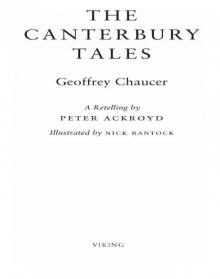 The Canterbury Tales
The Canterbury Tales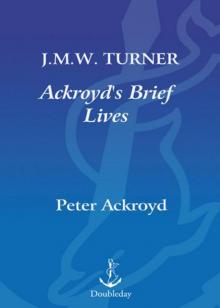 J. M. W. Turner
J. M. W. Turner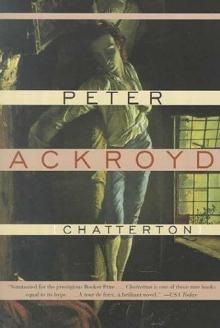 Chatterton
Chatterton The Canterbury Tales – A Retelling
The Canterbury Tales – A Retelling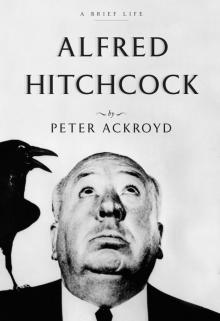 Alfred Hitchcock
Alfred Hitchcock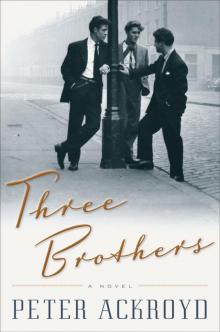 Three Brothers
Three Brothers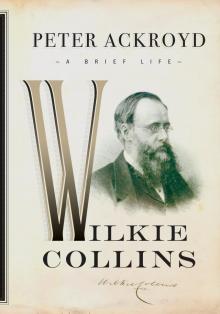 Wilkie Collins
Wilkie Collins Venice
Venice Poe
Poe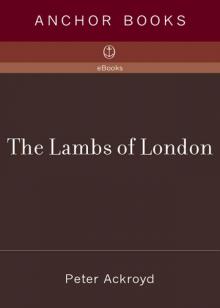 The Lambs of London
The Lambs of London London
London Queer City
Queer City Revolution, a History of England, Volume 4
Revolution, a History of England, Volume 4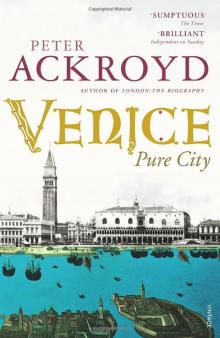 Venice: Pure City
Venice: Pure City Foundation
Foundation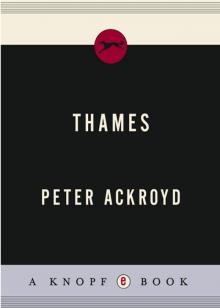 Thames
Thames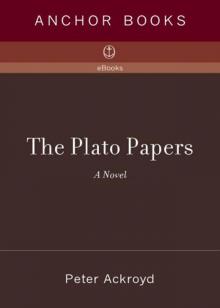 The Plato Papers
The Plato Papers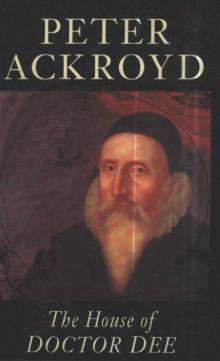 The house of Doctor Dee
The house of Doctor Dee Rebellion: The History of England from James I to the Glorious Revolution
Rebellion: The History of England from James I to the Glorious Revolution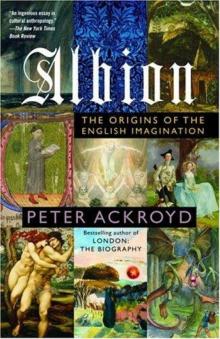 Albion: The Origins of the English Imagination
Albion: The Origins of the English Imagination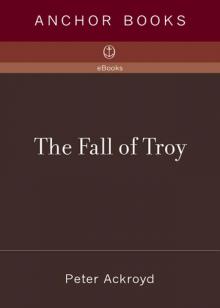 The Fall of Troy
The Fall of Troy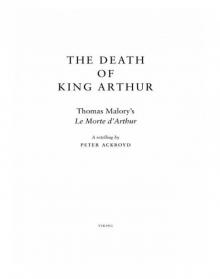 The Death of King Arthur
The Death of King Arthur The Trial of Elizabeth Cree
The Trial of Elizabeth Cree London: The Biography
London: The Biography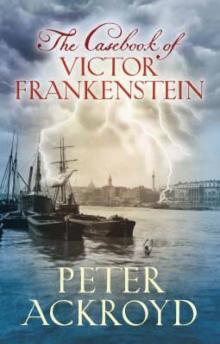 The Casebook of Victor Frankenstein
The Casebook of Victor Frankenstein Hawksmoor
Hawksmoor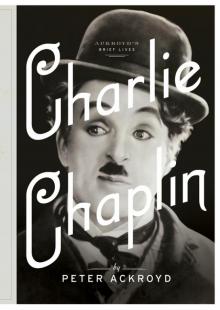 Charlie Chaplin
Charlie Chaplin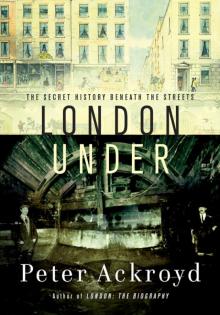 London Under
London Under